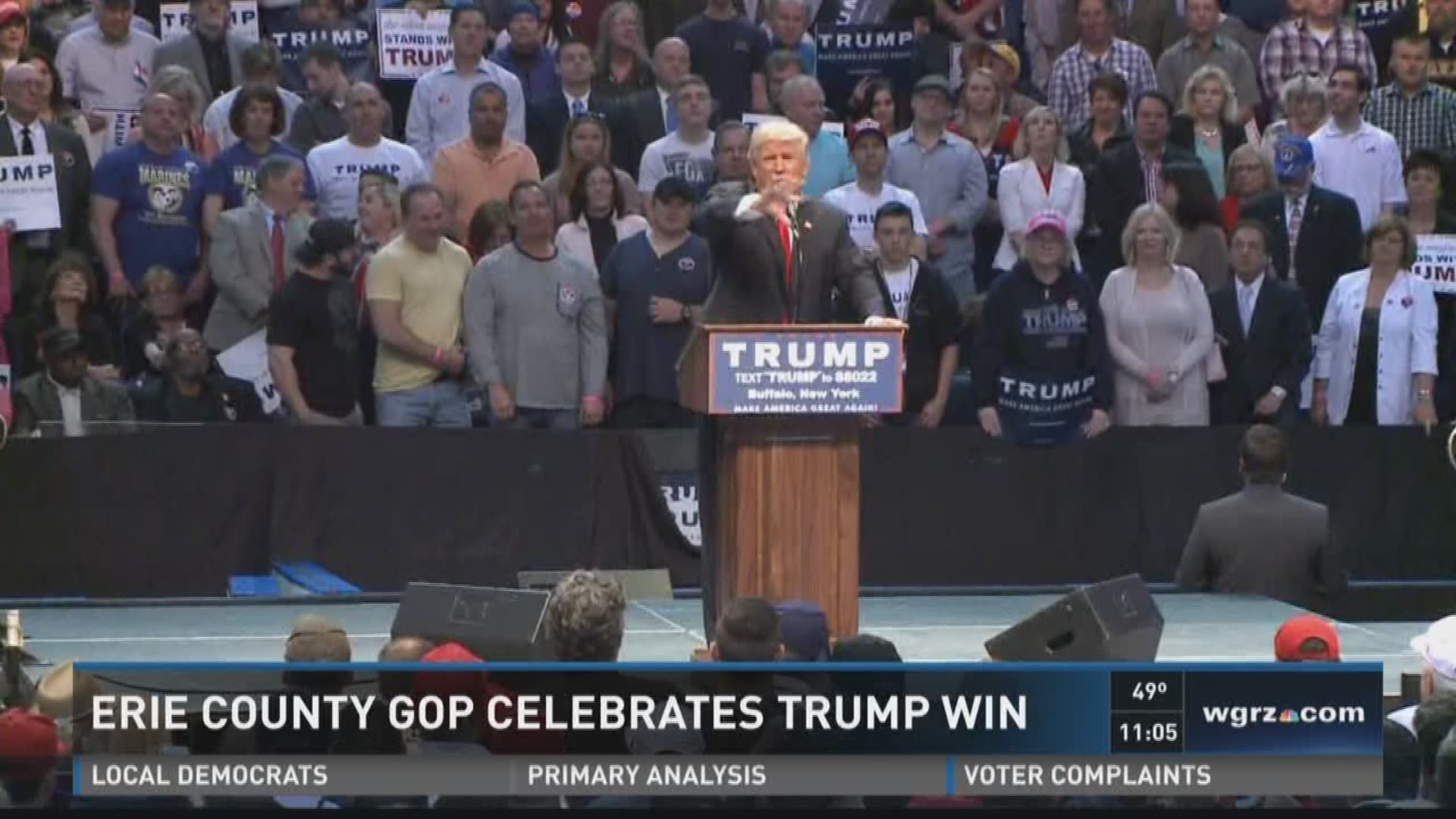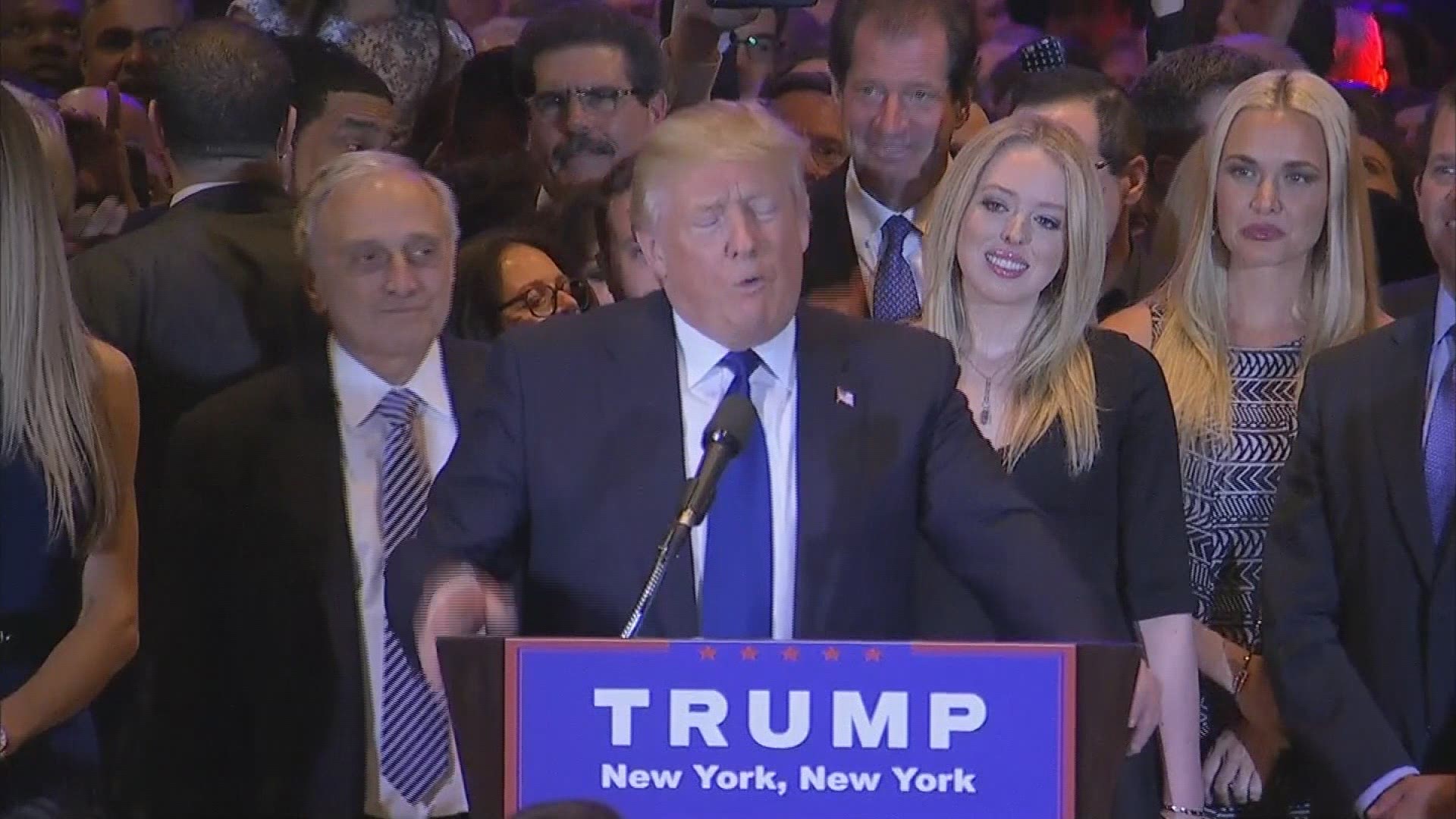ALBANY -- Donald Trump won his home state Tuesday night. And it wasn't even close.
Trump was declared the Republican presidential primary winner right when the polls closed at 9 p.m. in New York, a victory that moved him closer to securing the Republican nomination for president.
Trump was looking for a big win Tuesday night in New York as he aimed to put more distance between himself and his GOP foes, and he appeared to get it.
Trump was leading 60 percent to 25 percent over Ohio Gov. John Kasich, with 69 percent of districts reporting, the AP said. Texas Sen. Ted Cruz had 15 percent of the vote, according to unofficial results.
“It has been really something amazing,” Trump told supporters at Trump Tower in midtown Manhattan.
"This has been an amazing week all over New York state," he continued. "On average we’d have 15,000 to 20,000 people, we went to Rochester. We went to Bethpage. We went all over, and you know what? The people of this country and the people of this state are truly great and amazing people. We are going to be so strong again."
With 95 delegates at stake, New York is a huge prize for the Manhattan billionaire.
It was unclear Tuesday night how many of the delegates he would secure, but the sizable lead across New York made it clear he would win the vast majority of the delegates.
With 70 percent of the vote tallied, Trump had secured 48 delegates, according to AP.
Hillary Clinton beat Bernie Sanders for New York's primary win on the Democratic side.
Trump said he was hoping to hit the 50 percent mark in each of the state's 27 congressional districts to win the three Republican delegates available in each district. The remaining 14 GOP delegates go to the statewide winner — if the candidate wins at least 50 percent of the vote.
Results showed that Trump was well above 60 percent in some counties: including Erie, Dutchess and parts of New York City. He was hovering around 50 percent in parts of the Southern Tier and was slightly above it in Westchester and Monroe counties, results showed, but he was narrowly losing to Kasich in Manhattan.
"We’re targeting districts, but we’re really targeting the whole state. The key is the state," Trump told Gannett's Albany Bureau on Friday. "You get the big vote in the state, you’re going to take much of it."
Trump held massive rallies across New York, focusing his campaign mainly upstate. Large rallies were held in all the major upstate cities, as well as on Long Island and Plattsburgh in northern New York.
“We don’t have much of a race anymore," Trump declared Tuesday night.
Cruz and Kasich also toured the state trying to secure some of the delegates at stake.
Each of the 27 congressional districts had three delegates to award. If a candidate wins 50 percent of the vote in a district, he gets all three.
But if the winning candidate doesn't hit 50 percent, he will get two delegates and the second-place finisher will get one -- that's if the runner-up gets at least 20 percent of the vote.
So all the candidates were hoping to leave New York with some delegates.
But for Trump, he hoped his home state can separate him more from the pack. Trump went into the New York primary with 743 pledged delegates, while Cruz had 545 and Kasich had 143, according to the Associated Press.
If none of the candidates get to 1,237 by July, New York’s delegates will be able to vote for whomever they choose after the first ballot at the Republican National Convention in Cleveland.
Cruz came into New York facing an uphill battle after he said in a January debate that Trump represented "New York values." The comment was viewed as a slight on New York City and the state, and Trump has seized on the comments to knock his closest competitor.
"When it comes to New York values, other candidates do not like us," Trump says in a radio ad.
Cruz sought to explain the comment as a criticism of New York's liberal policies under its Democratic leaders.
“It’s the values of the liberal Democratic politicians that have been hammering the people of New York for a long time," Cruz said during a visit to the Bronx on April 6.
In Philadelphia on Tuesday night, Cruz vowed his campaign will continue and be successful.
"The people in state after state have made it clear. They cry out for a new path," Cruz said in a speech. "This is the year of the outsider. I am an outsider, Bernie Sanders is an outsider. Both with the same diagnosis, but both with very different paths to healing."
For Kasich, he framed his campaign in New York as the moderate choice to Trump or Cruz. And he also gained attention for trying all the different foods New York has to offer -- including eating his pizza with a fork.
"I'd move here just for the food," Kasich said Thursday on "The Capitol Pressroom," a public-radio show in Albany.
Kasich said Tuesday in Annapolis, Md., that a "deadlocked" convention could give him a chance at the Republican National Convention in July -- where Trump's delegate lead may be contested.
"There are no rules for the convention,” Kasich said, according to USA Today. “None have been created yet and even if they create rules, you can be nominated from the floor.”


